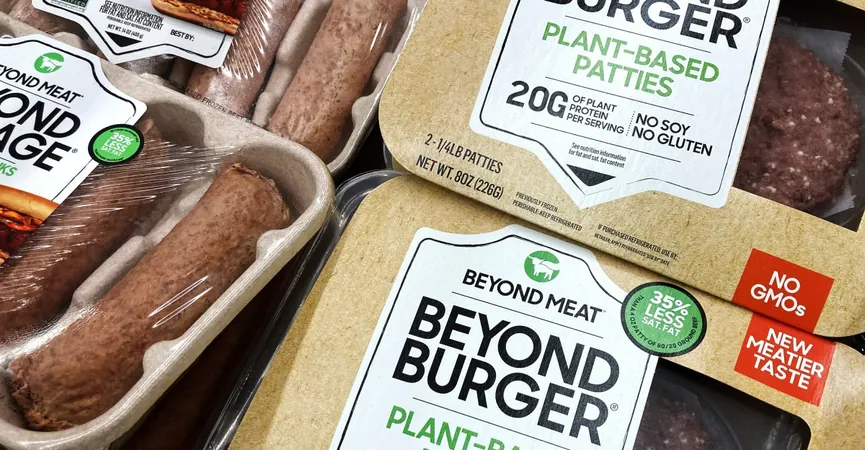
Are You Being Misled About “Ultra-Processed” Foods? The Truth About Plant-Based Diets
2024-12-19
Author: Ming
Introduction
This summer, media around the globe lit up with alarming reports claiming that consuming plant-based burgers could lead to dire health consequences, including heart disease. Headlines like “Vegan Fake Meats Linked to Heart Disease and Early Death,” courtesy of the New York Post, raised eyebrows and fears among consumers.
The Research Behind the Claims
However, a closer look at the research that sparked this panic reveals a different story—one that’s crucial for anyone interested in their health.
The claims originated from a study conducted by nutrition experts at the University of São Paulo and Imperial College London. The study utilized data from a cohort of over 118,000 individuals in the UK, examining dietary habits over a minimum of two days. Findings suggested that a rise in consumption of “ultra-processed” plant foods correlated with heightened rates of cardiovascular disease and premature mortality. In contrast, consuming whole, non-ultra-processed plant foods, like fruits and vegetables, was associated with better health outcomes.
Notably, plant-based meats played a negligible role in this research. They constituted a mere 0.2% of the total caloric intake across the sample, while the bulk of ultra-processed calories came from items like packaged breads, pastries, and cookies—not exactly the kind of wholesome offerings the vegan community champions. Additionally, it’s essential to understand that contemporary meat alternatives, such as the popular Impossible and Beyond Burgers, didn’t even exist when the study's data was collected between 2009 and 2012.
"Given their minimal contribution, we can't draw any substantial conclusions about plant-based meat alternatives," explained Fernanda Rauber, a leading researcher involved in the study.
Media's Focus on Plant-Based Meats
This raises the pressing question: Why were plant-based meats singled out in the media coverage? The answer is complex, touching on broader societal anxieties regarding industrialized food systems and the perceived dangers of ultra-processed foods (UPFs). Some high-profile political figures, including Robert F. Kennedy Jr. and Bernie Sanders, have positioned themselves against UPFs, suggesting that these foods pose a significant risk to public health.
Yet, a recent report from the scientific committee responsible for federal dietary guidelines acknowledged that evidence regarding the health implications of UPFs is still limited and that many related studies fall short of rigorous scientific standards. As people become increasingly concerned about their dietary choices, the idea that food companies might be compromising health has galvanized public discourse.
Nuanced Approach to Ultra-Processed Foods
Consumers are right to be wary, considering that many packaged foods do contribute to declining health outcomes. However, it’s critical to approach the issue of ultra-processed foods with nuance. The classification system, known as NOVA, categorizes foods based on their level of processing; it ranges from whole foods (Group 1) to ultra-processed foods (Group 4), the latter comprising items laden with additives and manufactured through complex industrial processes.
However, this system is not without its flaws. In fact, it can sometimes lump together drastically different food products, muddying the waters for consumers trying to make informed choices. For instance, traditional foods like tofu and tempeh—staples in many diets—are sometimes classified as ultra-processed despite having been enjoyed by various cultures for centuries. This can create unnecessary fear around entirely healthy options that have been integrated into diets globally.
The Misleading Discourse Around UPFs
The discourse around UPFs often lacks precision and can mislead consumers regarding the health implications of eating whole foods versus processed foods. For example, some plant-based meat alternatives are considerably healthier than conventional meats. Companies like Beyond Meat have demonstrated this, as their products often taper down saturated fats while delivering essential nutrients like protein and iron.
Conclusion
Ultimately, the key takeaway is that while it’s wise to limit ultra-processed foods, the blanket vilification of all processed options fails to recognize the myriad of healthy food choices available on the market today. For example, unsweetened soy products can be a better and more sustainable option than dairy milk.
To navigate this complex food landscape, consumers should concentrate on understanding the underlying nutritional values and health impacts of specific products rather than getting lost in the semantics of processing. As more research emerges, cultivating a balanced perspective on the foods we consume will be essential to making educated dietary choices that benefit both our health and the environment.
In today’s food-centric era, misinformation can have far-reaching effects. A more informed and discerning approach toward classifying and consuming food will allow consumers to enjoy the benefits of plant-based options while reducing unnecessary anxiety over their dietary decisions.



 Brasil (PT)
Brasil (PT)
 Canada (EN)
Canada (EN)
 Chile (ES)
Chile (ES)
 España (ES)
España (ES)
 France (FR)
France (FR)
 Hong Kong (EN)
Hong Kong (EN)
 Italia (IT)
Italia (IT)
 日本 (JA)
日本 (JA)
 Magyarország (HU)
Magyarország (HU)
 Norge (NO)
Norge (NO)
 Polska (PL)
Polska (PL)
 Schweiz (DE)
Schweiz (DE)
 Singapore (EN)
Singapore (EN)
 Sverige (SV)
Sverige (SV)
 Suomi (FI)
Suomi (FI)
 Türkiye (TR)
Türkiye (TR)